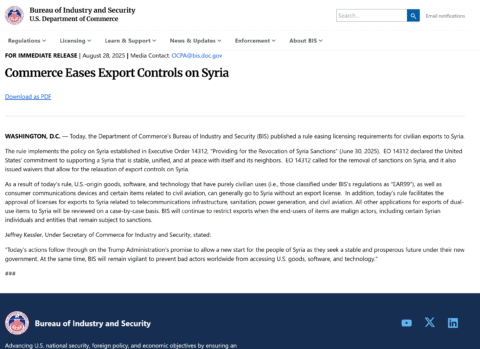Breaking down BIS’s announcement
Following the 2003 Syria Accountability and Lebanese Sovereignty Restoration Act, the U.S. imposed a unilateral, de facto trade embargo on Syria. It was a de facto embargo because exporting to Syria required a license; while, in comparison, licenses from the Office of Foreign Assets Control (OFAC) were difficult to obtain, those from the Bureau of Industry and Security (BIS) were virtually impossible to secure.
As of yesterday, and following the suspension of key elements of the Act in June:
No License Needed: Generally, you don’t need a license to export the following to Syria:
– Most purely civilian goods, software, and technology (known as EAR99).
– Consumer communication devices.
– Some items for civil aviation.
Easier to Get a License: It is now easier to get an approved export license for items related to:
– Telecommunications infrastructure
– Sanitation
– Power generation
– Civil aviation
Case-by-Case Review All other exports of dual-use items (products with potential civilian and military uses) will be reviewed on a case-by-case basis.
Given Syria’s limited merchandise trade with the U.S.—primarily due to geographic distance and weak comparative advantages, especially following China’s economic rise—the most immediate and positive impact of yesterday’s announcement will likely stem from lifting restrictions on IT services.
This development is particularly significant as it will allow Syrians to engage the world more effectively.

